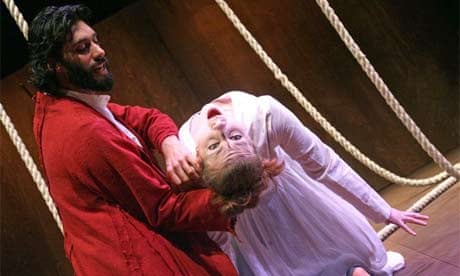I recently spoke to a young British Muslim playwright about the attention he was suddenly getting from a few mainstream theatres and TV companies. He is one of many plucked from the north of England via numerous schemes designed to "discover British Muslim voices", and he's in two minds about the belated interest in what he may have to say. On one hand, he is grateful for the opportunities presented to him; on the other, he is concerned about the type of stories he is asked to develop for commissioning editors and artistic directors. He told me that he wants to write stories about love and relationships. Instead, he has been "encouraged" to write stories about being a British Muslim, full of angst in a post-7/7 Britain.
So what should he do? Does he stand his ground and refuse the commission? He believes, as a matter of principle, that he probably should. However, he is painfully aware that if he steps down, another writer will quickly step in to replace him. So he takes the commission and justifies his decision by telling himself it's a stepping stone towards the things he really wants to do.
As a second-generation British Asian involved in the arts, I certainly benefited from multicultural arts policy in the mid-1980s. Back then, support from the Greater London council (GLC) allowed us to exist as theatre-makers in a world which, in the main, shunned us. But very quickly, I felt that I became a victim of multiculturalism. It seemed to be a double-edged sword – multicultural policy suited those who were happy to stay within the boundaries of "their own culture"; it seemed better to segregate in order to secure arts funding.
I first became aware of this in 1986. I wrote my first play for the Hounslow Arts Cooperative theatre and the company was in the process of receiving transitional funding from Hounslow council. The opening night was attended by councillors and the mayor of Hounslow, who seemed very supportive of new, multicultural theatre. I remember that some of the councillor's wives even wore saris; I think they wanted us to feel at home.
We were told afterwards that they had expected to see a spot of Kathak dancing and traditional south-Asian costume. Instead, they watched a play about three disaffected British Asian boys looking for a way out of a dead-end town. The characters spoke like me and my friends: a concoction of cockney slang, Jamaican patois and Punjabi. Like most kids from that part of the world, they swore, smoked cigarettes and played hip-hop. By the interval, most of the councillors and the mayor left in disgust; we received a letter from them, complaining that "we had let our parents and our culture down".
Many writers and producers like me want to share their stories with mainstream audiences. Is it possible that enforcing multicultural policies – conventionally accepted as being progressive and liberal – could actually make this more difficult?
If we are working towards a more integrated arts landscape, multicultural arts policies belong in the last century. Now, they only serve to keep black and Asian arts ghettoised and, ultimately, to keep ethnic minority practitioners out of the mainstream. The consequence is that over the past five or six years, black and Asian theatre is rapidly losing its voice. In the scramble to decipher what commissioning editors or artistic directors might want, theatre-makers and artists are increasingly conforming to the tick-box culture of "diversity" arts policy; they fear being replaced if they do not fit the remit.

Comments (…)
Sign in or create your Guardian account to join the discussion